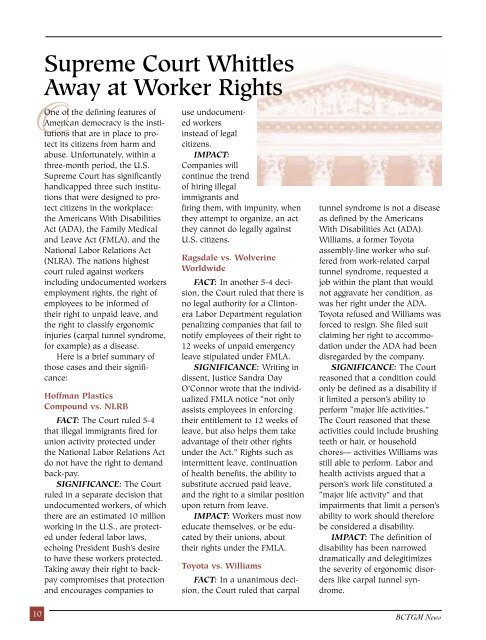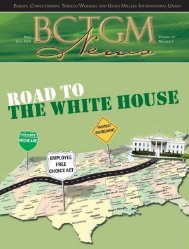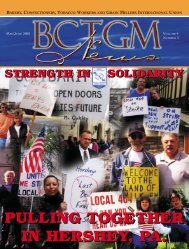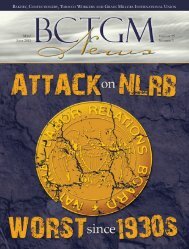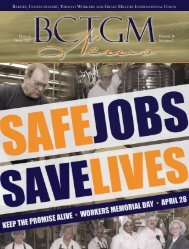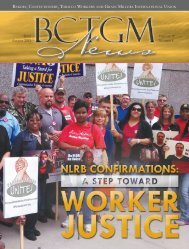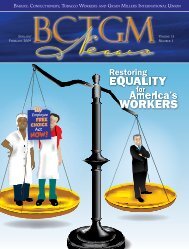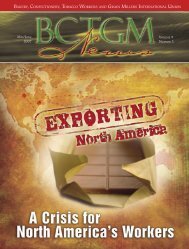to view/print. - Bakery, Confectionery, Tobacco Workers and Grain ...
to view/print. - Bakery, Confectionery, Tobacco Workers and Grain ...
to view/print. - Bakery, Confectionery, Tobacco Workers and Grain ...
- No tags were found...
You also want an ePaper? Increase the reach of your titles
YUMPU automatically turns print PDFs into web optimized ePapers that Google loves.
Supreme Court WhittlesAway at Worker RightsOOne of the defining features ofAmerican democracy is the institutionsthat are in place <strong>to</strong> protectits citizens from harm <strong>and</strong>abuse. Unfortunately, within athree-month period, the U.S.Supreme Court has significantlyh<strong>and</strong>icapped three such institutionsthat were designed <strong>to</strong> protectcitizens in the workplace:the Americans With DisabilitiesAct (ADA), the Family Medical<strong>and</strong> Leave Act (FMLA), <strong>and</strong> theNational Labor Relations Act(NLRA). The nations highestcourt ruled against workersincluding undocumented workersemployment rights, the right ofemployees <strong>to</strong> be informed oftheir right <strong>to</strong> unpaid leave, <strong>and</strong>the right <strong>to</strong> classify ergonomicinjuries (carpal tunnel syndrome,for example) as a disease.Here is a brief summary ofthose cases <strong>and</strong> their significance:Hoffman PlasticsCompound vs. NLRBFACT: The Court ruled 5-4that illegal immigrants fired forunion activity protected underthe National Labor Relations Actdo not have the right <strong>to</strong> dem<strong>and</strong>back-pay.SIGNIFICANCE: The Courtruled in a separate decision thatundocumented workers, of whichthere are an estimated 10 millionworking in the U.S., are protectedunder federal labor laws,echoing President Bush’s desire<strong>to</strong> have these workers protected.Taking away their right <strong>to</strong> backpaycompromises that protection<strong>and</strong> encourages companies <strong>to</strong>use undocumentedworkersinstead of legalcitizens.IMPACT:Companies willcontinue the trendof hiring illegalimmigrants <strong>and</strong>firing them, with impunity, whenthey attempt <strong>to</strong> organize, an actthey cannot do legally againstU.S. citizens.Ragsdale vs. WolverineWorldwideFACT: In another 5-4 decision,the Court ruled that there isno legal authority for a Clin<strong>to</strong>neraLabor Department regulationpenalizing companies that fail <strong>to</strong>notify employees of their right <strong>to</strong>12 weeks of unpaid emergencyleave stipulated under FMLA.SIGNIFICANCE: Writing indissent, Justice S<strong>and</strong>ra DayO’Connor wrote that the individualizedFMLA notice “not onlyassists employees in enforcingtheir entitlement <strong>to</strong> 12 weeks ofleave, but also helps them takeadvantage of their other rightsunder the Act.” Rights such asintermittent leave, continuationof health benefits, the ability <strong>to</strong>substitute accrued paid leave,<strong>and</strong> the right <strong>to</strong> a similar positionupon return from leave.IMPACT: <strong>Workers</strong> must noweducate themselves, or be educatedby their unions, abouttheir rights under the FMLA.Toyota vs. WilliamsFACT: In a unanimous decision,the Court ruled that carpaltunnel syndrome is not a diseaseas defined by the AmericansWith Disabilities Act (ADA).Williams, a former Toyotaassembly-line worker who sufferedfrom work-related carpaltunnel syndrome, requested ajob within the plant that wouldnot aggravate her condition, aswas her right under the ADA.Toyota refused <strong>and</strong> Williams wasforced <strong>to</strong> resign. She filed suitclaiming her right <strong>to</strong> accommodationunder the ADA had beendisregarded by the company.SIGNIFICANCE: The Courtreasoned that a condition couldonly be defined as a disability ifit limited a person’s ability <strong>to</strong>perform “major life activities.”The Court reasoned that theseactivities could include brushingteeth or hair, or householdchores— activities Williams wasstill able <strong>to</strong> perform. Labor <strong>and</strong>health activists argued that aperson’s work life constituted a“major life activity” <strong>and</strong> thatimpairments that limit a person’sability <strong>to</strong> work should thereforebe considered a disability.IMPACT: The definition ofdisability has been narroweddramatically <strong>and</strong> delegitimizesthe severity of ergonomic disorderslike carpal tunnel syndrome.10BCTGM News


